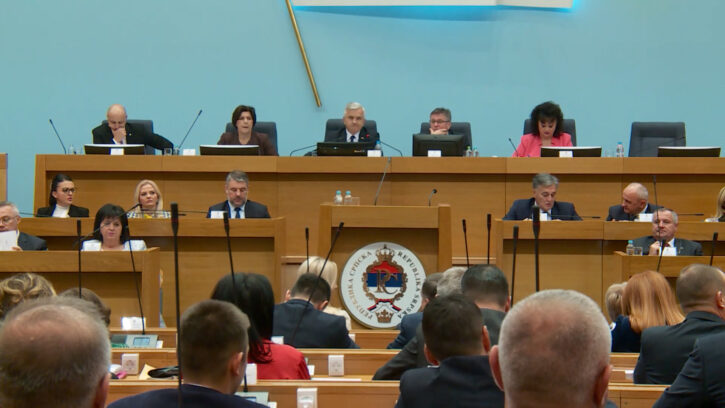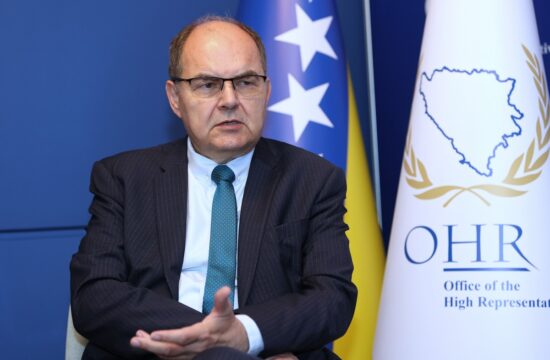
After a 15-hour session, the parliament of Bosnia’s Serb-majority entity adopted 20 conclusions early Tuesday morning which include, among other things, activities aimed at abolishing the office of Bosnia’s international administrator and reversing a series of post-war reforms in the country.
MP’s in the National Assembly of Republika Srpska (RS, one of Bosnia’s two semi-autonomous entities), discussed a document called ‘Unconstitutional Transformation of the Dayton structure of Bosnia and Herzegovina and impact on the position and rights of the RS’.
After the 1995 Dayton Peace Agreement, which includes the country’s Constitution, Bosnia’s two entities – the Federation (FBiH), which occupies 51 percent of the country and is mostly populated by Bosniaks and Croats and Republika Srpska which has 49 percent of the territory – had their own institutions such as armies, tax and judicial systems.
Over the years the state parliament melted those into joint, state-level systems.
The ruling Bosnian Serb party, however, argues that that too many authorities which were given to Republika Srpska according to the Dayton Agreement were transferred to the state-level government. Bosnian Serb leader and member of the tripartite state Presidency, Milorad Dodik, claims this represents a violation of Bosnia’s Constitution, although Bosnian Serb lawmakers in the country’s parliament have also voted for the reforms.
Dodik, who has often advocated for the secession of the RS from Bosnia and Herzegovina, said that the reforms implemented after the war were carried out under pressure from international representatives who “manipulated with a fake compromise” while working in the interests of Bosniaks who prefer a centralised state.
Dodik’s Alliance of Independent Social Democrats (SNSD) asked lawmakers in the RS to, among other things, work toward abolishing the Office of the High Representative (OHR) – the international official tasked with overseeing the civilian implementation of the Dayton Agreement.
Another reason for the special session was Bosnia’s failure to form a new government – officially called the Council of Ministers – since the 2018 election.
The reason is bickering among the three Presidency members over whether Bosnia should send the Annual National Programme (ANP) to NATO.
Although Bosnian Serb representatives agreed to the country joining NATO years ago, they changed their minds and now refuse any step in that direction to be made. The new Chairman of the Council of Ministers is supposed to come from the SNSD, and the Bosniak and Croat Presidency members refuse to vote for him until the ANP is sent.
Bosnian Serb representatives have been accusing the two Presidency members of preventing the electoral will of the people being implemented.
“In case of the right of peoples to self-determination is denied, as proclaimed by the UN Charter, and any further support for activities leading to the degradation of the Dayton Agreement, the RS reserves the right to finally decide on its future status,” said one of the conclusions reached by MPs.
The lawmakers expressed support for cooperation with NATO and its key members on security issues, but opposed Bosnia’s membership in the alliance, primarily because they argued that the creation of a NATO border with neighbouring Serbia is unacceptable. They also concluded that NATO accession would produce an enormous cost to Bosnia and Herzegovina and the RS.
“In the case of any violent attempts of Bosnia and Herzegovina's accession to NATO, the RS will hold a referendum at which citizens will decide on whether the RS will be a member of any military alliances,” all 53 MPs adopted unanimously.
The National Assembly tasked the Government to analyze the effects of the, as the lawmakers put it, unconstitutional transfers of competences from the entity level to the state level, including the competences transferred through the inter-entity agreements regarding defence and indirect taxes.
The result of the analysis would be then discussed with the other entity and with representatives of the country’s Bosniaks and Croats.
The Assembly tasked the RS Government to prepare for an eventual separation of the RS from the country’s value-added tax system and for the opening of a special VAT account for the RS.







